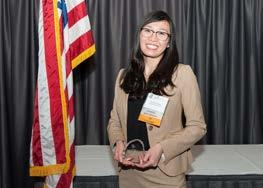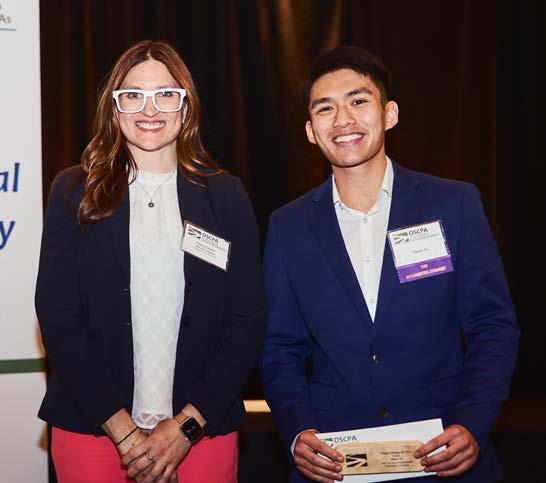
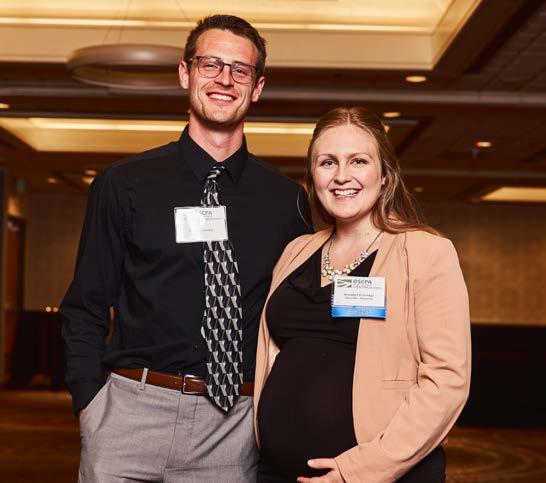
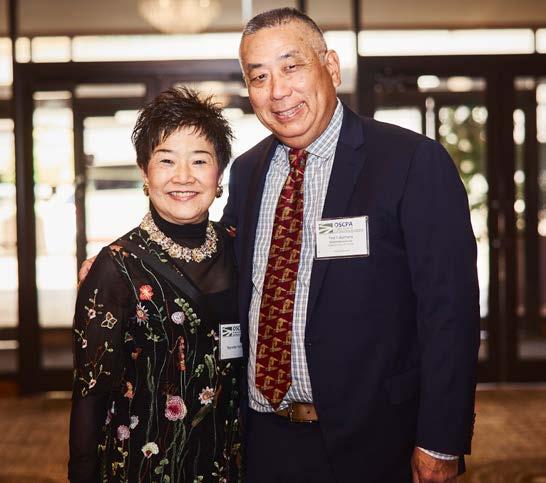
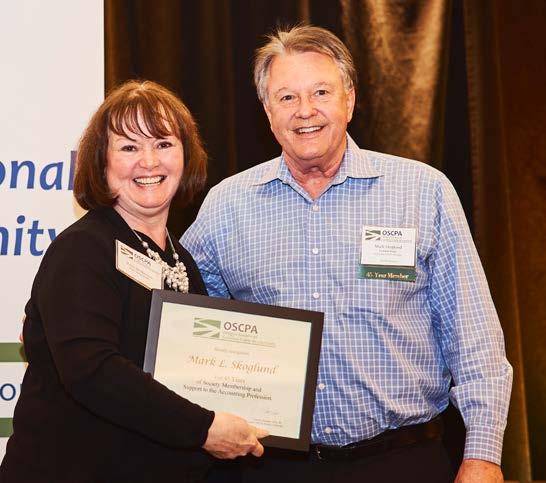















































































Publisher
Oregon Society of CPAs
Mailing address
10206 SW Laurel St., Beaverton, OR 97005-3209
503-641-7200 | 800-255-1470 | Fax: 503-626-2942 www.orcpa.org | information@orcpa.org
Chair
John Hawkins
Chair-Elect
Gary Holcomb
Vice Chair
Adam Abplanalp
Past Chair
Tracy Allen
Board of Directors
Tricia Duncan
Jonathan Grover
Cameron Irtifa
Megan Kurz
Michael Lortz
Tiffany Nash
Harriet Strothers
RL Widmer III
Yvonne Zbranak
President/CEO
Sherri McPherson, IOM, CAE
Managing Editor Analiese Terrazas aterrazas@orcpa.org
Editor
Susan Fleming sfleming@orcpa.org
Chapter Council Chairs
Benton-Linn
Ross Holliday
Central Oregon
Yvonne Zbranak
Eastern Oregon
Jody Deardorff
Emerald Empire
Sarah Coffman
Mid-Columbia
Angelo Sampson
South Coast
Larry Reiber
Southern Oregon
Matthew Bowers
Navigating the Oregon estate tax 12
Empowering DEI in the workplace 16
6 ways a professional association can boost your career 20
Strategic Leadership Forum recap 27
Rising Stars spotlights 28
Chair’s Message 5
Member News 7
Congratulations new CPAs 11
Professional Development 31
Accounting Practice Sales 2
CPACharge 23
The Oregon Society of CPAs assumes no responsibility for statements or advertisements herein and reserves the right to reject any advertising. Statements and opinions expressed are those of authors and not necessarily those of OSCPA. Publication of an advertisement does not constitute an endorsement of the product or service by Accounting Connect or OSCPA.
Update your contact information at www.orcpa.org/my-cpa/profile
Copyright© OSCPA 2024
Magazine design by Joleen Funk
joleen.funk@gmail.com
Cover images by Fletcher Wold Photography
Stock images by istockphoto.com & stock.adobe.com
Connect with OSCPA


Private Practice Transitions 31
CAMICO 35





As you read this, we are in the middle of summer. I hope everyone has the chance to get out and enjoy the beauty of this season.
In mid-May, I was honored to be onstage as Master of Ceremonies for one of my favorite OSCPA events, the Circle of Excellence awards, celebrating people from all stages of their careers. It was wonderful to honor OSCPA members reaching significant member milestones (of up to 55 years). We also recognized top accounting students from Oregon’s colleges and universities. In addition to maintaining incredible GPAs, many of these students volunteer and achieve amazing accomplishments while still in school. My favorite part of the evening was joining Chris Dahlvig, President of The OSCPA Educational Foundation, and greeting each of the scholarship recipients. This year the Foundation awarded 61 scholarships totaling $170,200, a record amount for the Foundation. Many thanks to the firms and individuals who donated to the Foundation to support these students as they complete their accounting education and begin their careers. The evening was capped by the Board of Accountancy recognizing those who have passed the Uniform CPA Exam and those who have received their CPA license in the last 12 months. It was an honor to meet these new CPAs and see their excitement as they begin their careers!
Soon thereafter, I attended the AICPA Spring Council meeting in Orlando, FL. The Council received an unexpected announcement from Barry Melancon that he was retiring
as CEO of AICPA, effective December 31, 2024. Barry has been the face of the AICPA for most of my career and it is hard for me to picture the AICPA without him at the helm. Elected CEO in 1995, he has been an advocate and visionary for the CPA profession, leading change in the profession and the AICPA. His successor should be named by the end of the year.
Both firm leaders and industry CFOs have indicated staff recruitment and retention as one of their top concerns, and often the number one concern. Based on our profession’s pipeline concerns, the AICPA Council convened the National Pipeline Advisory Group (NPAG) in the spring of 2023. The objective was to develop a cohesive national strategy to address the talent shortage. The core value strategies developed were to be data-driven, inclusive, and diverse in subject matter. After a year of intensive work, the NPAG presented an 85-page draft report to the Council.
The themes in the data and recommendations were:
•Make the academic experience more engaging
Only 1 in 8 business majors graduate with a bachelor’s degree in accounting We need to revamp the accounting curriculum and its delivery We must enhance support to help “pull” students through accounting programs and boost retention.
• Expand access for underrepresented groups
Minority groups are underrepresented in our profession. Greater financial assistance can be provided for
socioeconomically impacted students from all racial/ethnic groups. We must promote smooth transitions between community colleges and four-year institutions.
• Grow support for CPA Exam candidates
Effective January 2024, candidates can take the new CPA exam. Three sections of the exam are mandatory, but the fourth section is elective, among Tax, IT, or Business Reporting. Employers can support students by providing PTO to study for the CPA exam and paying bonuses after completion of the exam.
OSCPA advanced a successful bill in the 2023 Oregon Legislature, effective January 1, 2024, which lowered the threshold to sit for the exam to 120 semester hours, enabling candidates to sit for the exam after finishing their bachelor’s degree.
• Address time and cost of education
Allow increased college credit for experience and internships. The AICPA has the newly launched Experience-Learn-Earn (ELE) program that gives up to 30 hours of credit through self-study online courses while employed, providing additional credits for work experience. Accounting faculty and institutions can further support the pipeline by offering college credit for CPA exam preparation courses.
Over the last year, the Oregon Board of Accountancy has completed significant rule changes, including allowing up to 12 semester hours for internships. OSCPA is participating in that ongoing collaborative process as several sets of rules have been approved during the last year; statutory proposals to assist the pipeline are in process as well.
• Enhance employee experience
A significant issue is that starting salaries for accounting graduates are less than salaries of other business graduates. We must make starting salaries competitive with other careers. We must be more transparent with career progression and provide flexibility. We must invest in leadership training and mentoring. We must address overload and burnout. Providing work-life balance is crucial to retaining employees. The PCPS section of the AICPA has developed a Firm Business Model Transformation that incorporates reducing workload by reducing client base to allow capacity for ideal clients combined with increasing fees to maintain profit.
• Tell a more compelling story.
The last theme of the NPAG report was to “Tell a more compelling story.” This theme emphasizes the importance of getting into high schools to make students aware of accounting careers. Nearly 45% of business administration majors decided their majors before enrolling in college. The timing of student outreach is key. As Carla McCall, AICPA board chair, said in a recent Journal of Accountancy article, “We need to promote the cool work we do.” See more on page 25
I truly enjoy the role of being my client’s most trusted advisor. We need to share those stories with others, especially the next generation of CPAs, to positively impact the pipeline. The profession offers a breadth of opportunities and choices for an engaging and productive career. We need to talk about those positives otherwise young people and their parents, who rightfully so influence them, do not get the full picture of the profession.
My view of the pipeline issue is that we must do all we can to funnel high school students into the pipeline and then work to minimize leakage out of the pipeline that can occur during college, graduation, sitting for the exam, successfully completing the exam, and the early stages of their career as a licensed professional.
• GenAI in accounting
Last but not least, a final topic from the Spring Council meeting focused on GenAI. I have for years been an advocate for leaning into technology and working smarter, not harder. GenAI has the potential to usher changes in how technology is used in the CPA profession in ways we have never seen before. These changes are happening now and could rapidly affect how we do our work.
Just as the seasons have changed from spring to summer, our CPA profession is in a time of change. I hope you will get involved and stay abreast of the changes to bring new opportunities to your career. It is an exciting time!
John

John Hawkins, JD, CPA 2024-25 Chair, OSCPA Board of Directors ChairJohn@orcpa.org
Adam Abplanalp, Cobalt PC, Portland and Rachel Tarver, Moss Adams LLP, Portland were named to Portland Business Journal’s 2024 40 Under 40 Honorees.
Erica Aitken was recently promoted to partner at Wicks Emmet LLP, Roseburg.
Elizabeth Almer, Portland State University, Portland, Bradley Bingenheimer, SingerLewak LLP, Salem, Amy John, Oregon Secretary of State Audits Division, Salem, Daniel Miley, Talbot Korvola & Warwick LLP, Portland, Tonya Moffitt, Merina + Co., Tualatin, and Nancy YoungOliver, TriMet, Portland, spoke at OSCPA’s Governmental Accounting & Auditing Conference.
Bob Armstrong, Solutions CPAs PC, John Day was named as chair of BEO Bancorp, holding company for the Bank of Eastern Oregon.
Theresa Bakker, O’Leary’s Tax Service LTD, Vancouver, WA, Evan Dickens, Jones & Roth PC, Bend, and Ryan Northcutt, Aldrich CPAs + Advisors LLP, Lake Oswego, spoke at OSCPA’s ERISA Conference.
Tricia Duncan, Brooke Deering, and Jeremy Prickel of Jones & Roth PC, Eugene spoke at the Oregon State University Beta Alpha Psi meeting on “Finding your Niche” in public accounting.
Jared Holum, Perkins & Co., Portland recently joined the Board of Directors for Sport Oregon. Chad Averill, Moss Adams LLP, Portland and Kevin Kukar, M Financial Group, Portland are also on the Board.
Kristina Oliveira, Kern & Thompson LLC, Portland, Ashley Osten, Moss Adams LLP, Portland, Katie Sheffield, Kern & Thompson LLC, Portland, and Kathleen Sohl, Kay Sohl Consulting, Portland, spoke at OSCPA’s Not-for-Profit Conference.





Share your news!
Submit your recent professional news to communications@orcpa.org and stay connected with your community.
















Cass Hausserman, Portland State University School of Business, Portland, co-led a mock class with student panel members Tasneem Anjary and Ngan (Emily) Dinh for accounting students at Centennial High School in Gresham.
“
As business students and an ambassador at Portland State University School of Business, we cherished the curiosity, interaction, and the willingness to learn from each other between the high school students and the university. — Ngan (Emily) Dinh

Your non-CPA professionals may be eligible for OSCPA membership, allowing them access to:
• Deeper knowledge of the CPA profession and the issues facing your firm.
• Professional communications such as the member magazine and newsletters.
• Free educational series such as InfoBites and other programming.
• Opportunities for knowledge and skills building through professional development courses.
• Leadership training through the annual OSCPA Leadership Academy (LEAP)™.
Contact membership@orcpa.org or 503-641-7200 / 800-255-1470, ext. 4 to check eligibility or visit www.orcpa.org/join
Central Oregon
Cynthia Cox, Redmond
Randall Higbe, Capstone Certified Public Accountants LLC, Prineville
Eastern Oregon
Jeanie Dexter, Guyer Lindley Bailey & Martin CPAs PC
dba Guyer & Associates CPAs, Baker City
Emerald Empire
Ashraf Lakhani Farishta, Umpqua Valley Financial LLC, Roseburg
Jason Murphy, Levi Strauss & Co., Eugene
Kacey Rost Owsley, Zip-O-Log Mills, Eugene
Troy Sherwood, Isler CPA LLC, Eugene
Metro Portland
Jordan Akana, Oregon Mutual Insurance Co., McMinnville
Beatrix Bacher, Moss Adams LLP, Portland
John Baglien, Moss Adams LLP, Portland
Tanner Brown, Moss Adams LLP, Portland
Nathaniel Cantonwine, Newberg
Luke Dillon, Opus Agency, Beaverton
Michael Guenther, TD Consulting Group PC, Milwaukie
Jerry Han, WithumSmith + Brown PC, Portland
Tara Kamp, Pauly Rogers and Co. PC, Tigard
Brett Lubay, Reitmeier, Tualatin
Elizabeth Luna, TD Consulting Group PC, Milwaukie
Luke McNaughton, Dougall Conradie LLC, Portland
Hannah Price, Moss Adams LLP, Portland
Joshua Ramsey, Portland
Steven Resnikoff, Premier Retirement Services Inc., Wilsonville
Jourdan Rivera, Moss Adams LLP, Portland
Amanda Ross, Moss Adams LLP, Portland
Michael Ruck, Bagley & Company LLC, Salem
Mark Tanner, Gary McGee & Co. LLP, Portland
Christopher Tash, Moss Adams LLP, Portland
Kelly Vingelen, Newberg
Kimberly Waara, Dougall Conradie LLC, Portland
Southern Oregon
Justin Shenandoah, Premier Community Supports LLC, Grants Pass
Elizabeth Muckerheide, Firestone Pacific Foods, Vancouver, WA
Michael Rankin, BDO USA PC, Anchorage, AK
Mindy Swank, Swank CPA LLC, Camas, WA
Idman Ahmed, Beaverton
Gabriella Allen, Albany
Elizabeth Barnes, Klamath Falls
Armando Barrera Rubio, Beaverton
Elizabeth Blanchette, Vancouver, WA
Faith Bradley, Springfield
Hannah Bradley, Enterprise
Rosa Calabrese, Beaverton
Aaron Cote, Seaside
Thomas Dansdill, Portland
Prescott Donovan, Portland
Brendan Finnerty, Tigard
Tyler Frederick, Portland
Zane Goldman, Vista, CA
Matthew Hainley, Sherwood
Marcus Hillenkamp, Dougall Conradie LLC, Portland
Lindsey Ivie, Portland
Haylie Kuehner, Harrisburg
Megan McChesney-Thackeray, Albany
Shamsa Mohammed, Portland
Carson Montgomery, Beaverton
Alexander Moossa, Lake Oswego
Huong Ngo, Portland
Vy Pham, Portland
Patchariya Phaungsuwan, Portland
Hong Qian, Portland State University, Portland
Laura Rasay Siasoco, Lake Oswego
Suzie Roane, Portland
Zoie Rodman, Kelso, WA
Ashley Root, Springfield
Lillian Root, Washington State University, Vancouver, WA
Jennifer Salcido, Eugene
Masaki Satomi, Corvallis
Rachel Shimokawa, Portland
Sarah Siegele, Financial Investment Team, Portland
Anthony Swendrowski, Mercer Island, WA
Uriel Torres Torres, Salem
Samuel Urman, NW Natural, Portland
Kaylee Worrall, Salem
Jake Yan, Eugene

CPAs and lawyers battled it out on the cornhole boards to raise funds for Friends of Seasonal & Service Workers at the inaugural "Profit and Toss" Tournament. Over drinks and food at the Rogue Eastside Pub and Pilot Brewery, twenty-three teams competed to determine who would receive the golden corn husk trophy with spectators cheering them on. After five rounds and twenty-one matchups, the lawyers claimed victory. Congratulations to tournament champions DeAndre Jackson and Isaiah Hardy!
Thank you to our sponsors Perkins & Co. and Sussman Shank LLP.

Organized by the OSCPA's Young Professionals Committee and the Multnomah Bar Association's Young Lawyers Section (MBA YLS) Service to the Public Committee.
Congratulations new CPAs. We are proud and excited to welcome you to the profession.






Jordan Akana, Oregon Mutual Insurance Co., McMinnville
Tanner Brown, Moss Adams LLP, Portland
Luke Dillon, Opus Agency, Beaverton
Sean Funk, McDonald Jacobs PC, Portland
Elizabeth Muckerheide, Firestone Pacific Foods, Vancouver, WA


Amanda Ross, Moss Adams LLP, Portland
Lucas Scott, Delap LLP, Lake Oswego
Troy Sherwood, Isler CPA LLC, Eugene
Christopher Tash, Moss Adams LLP, Portland

by Art Werner, JD, MS (Taxation)
Estate planning is a crucial aspect of financial management, especially for residents of Oregon, where state-specific estate taxes can significantly impact the transfer of wealth. Understanding the nuances of the Oregon estate tax and implementing effective estate planning strategies can help mitigate tax liabilities and ensure a smooth transition of assets to beneficiaries. This article discusses the complexities of the Oregon estate tax and offers comprehensive estate planning strategies for 2024.
Understanding the Oregon estate tax - The Oregon estate tax is a state-level tax imposed on the transfer of the estate of a deceased person. Unlike the federal estate tax, which has a much higher exemption threshold, the Oregon estate tax applies to estates valued at $1 million or more. This relatively low exemption threshold means that many estates in Oregon may be subject to state estate taxes, making it essential for residents to engage in proactive estate planning.
Tax Rates and Exemptions - For the 2024 tax year, the Oregon estate tax rates range from 10% to 16%, depending on the value of the estate. The tax is calculated on the portion of the estate that exceeds the $1 million exemption threshold. Here is a breakdown of the tax rates:
• $1 million to $1.5 million: 10%
• $1.5 million to $2.5 million: 10.25% to 10.5%
• $2.5 million to $3.5 million: 11% to 11.5%
• $3.5 million to $4.5 million: 12% to 12.5%
• $4.5 million to $5.5 million: 13% to 13.5%
• $5.5 million to $6.5 million: 14% to 14.5%
• $6.5 million to $7.5 million: 15% to 15.5%
• Over $7.5 million: 16%
Filing Requirements - Estates that meet or exceed the $1 million threshold must file an Oregon Estate Transfer Tax Return (Form OR-706). The return is due nine months after the date of death, although an extension of up to six months can be requested. It is important to note that the extension applies only to the filing deadline, not the payment of the tax.
Estate Planning Strategies for 2024 - Given the relatively low exemption threshold and the progressive tax rates, effective estate planning is essential for Oregon residents. Here are several strategies to consider for minimizing estate tax liabilities and ensuring a smooth transfer of assets.
One of the most effective ways to reduce the size of an estate and minimize estate taxes is through lifetime gifting. By transferring assets to beneficiaries while still alive, individuals can reduce the value of their taxable estate. The federal gift tax exemption for 2024 is $17,000 per recipient per year, meaning individuals can gift up to this amount to any number of recipients without incurring federal gift taxes. Oregon does not have a state gift tax, making this strategy particularly advantageous.
Trusts are powerful tools for estate planning, offering both tax benefits and control over asset distribution. Several types of trusts can be utilized to minimize estate taxes:
•Revocable LivingTrusts: While these trusts do not provide estate tax benefits, they can help avoid probate and ensure a smooth transfer of assets.
•Irrevocable Life InsuranceTrusts (ILITs): By placing a life insurance policy in an ILIT, the death benefit can be excluded from the taxable estate, reducing estate tax liability
•Charitable RemainderTrusts (CRTs): These trusts allow individuals to donate assets to a charity while retaining an income stream for a specified period. The donated assets are removed from the taxable estate, and the donor may receive a charitable deduction.
The unlimited marital deduction allows for the transfer of assets between spouses without incurring estate taxes. By taking advantage of this deduction, married couples can defer estate taxes until the death of the surviving spouse. Additionally, the use of a Qualified Terminable Interest Property (QTIP) Trust can provide income to the surviving spouse while preserving the principal for other beneficiaries, such as children from a previous marriage.
While Oregon does not have a portability provision for its estate tax, the federal estate tax exemption is portable between spouses. This means that if one spouse does not use their entire federal estate tax exemption, the unused portion can be transferred to the surviving spouse. To take advantage of this, the estate must file a federal estate tax return (Form 706) and elect portability
For estates that include interests in closely-held businesses or family limited partnerships, valuation discounts can be applied to reduce the taxable value of these interests. Discounts for lack of marketability and lack of control can significantly lower the estate tax liability. However, it is important to work with a qualified appraiser to ensure that the discounts are properly applied and documented.
In addition to the federal gift tax exemption, individuals can make annual exclusion gifts to reduce the size of their estate. For 2024, the annual exclusion amount is $18,000 per recipient. By making regular annual exclusion gifts, individuals can transfer significant wealth over time without incurring gift taxes or reducing their lifetime gift tax exemption.
FLPs are entities that allow family members to pool their assets and manage them as a single entity. By transferring assets to an FLP , individuals can retain control over the assets while reducing the taxable value of their estate. Additionally, FLPs can provide valuation discounts for lack of marketability and lack of control, further reducing estate tax liability
Charitable giving can be an effective way to reduce estate taxes while supporting causes that are important to the individual. Donations to qualified charitable organizations are deductible from the taxable estate, reducing estate tax liability. In addition to outright gifts, individuals can establish charitable trusts, such as Charitable Remainder Trusts (CRTs) or Charitable Lead Trusts (CLTs), to achieve both philanthropic and tax planning goals.
Life insurance can play a critical role in estate planning by providing liquidity to pay estate taxes and other expenses. By purchasing a life insurance policy and placing it in an Irrevocable Life Insurance Trust (ILIT), the death benefit can be excluded from the taxable estate This ensures that the proceeds are available to cover estate taxes without increasing the estate’s tax liability.
Estate planning is not a one-time event but an ongoing process. It is essential to regularly review and update estate plans to reflect changes in tax laws, financial circumstances, and family dynamics. Working with an experienced estate planning attorney and financial advisor can help ensure that the estate plan remains effective and aligned with the individual’s goals.
The Oregon estate tax presents unique challenges for residents, given its relatively low exemption threshold and progressive tax rates. However, with proactive estate planning and the implementation of effective strategies, individuals can minimize estate tax liabilities and ensure a smooth transfer of assets to their beneficiaries. By understanding the complexities of the Oregon estate tax and utilizing tools such as lifetime gifting, trusts, and charitable giving, residents can achieve their estate planning goals and preserve their wealth for future generations.
As tax laws and financial circumstances evolve, it is crucial to stay informed and work with qualified professionals to navigate the complexities of estate planning. By doing so, individuals can create a comprehensive estate plan that reflects their values, protects their assets, and provides for their loved ones.

Art Werner, JD, MS (Taxation), is president and shareholder of WernerRocca Seminars, Ltd. His lecture topic specialties include business, tax, financial and estate planning for high net worth individuals.
Estate Planning for 2024 & Beyond: Oregon & Washington Issues - Beaverton + Webcast
• October 31, 2024
The Complete Guide to Oregon Death Taxation - Beaverton + Webcast
• November 1, 2024
Sign up today: www.bit.ly/3ygbfym

U N I Q U E
A n d s o i s y o u r
O S C P A m e m b e r s h i p . w w w . o r c p a . o r g / b e n e f i t s

As the accounting industry grapples with talent shortages, a new comprehensive report from MassCPAs sheds light on the critical issue of diversity, equity, and inclusion within the profession. The report, “Workplace Inclusion: An Imperative for Change in the Accounting Profession,” by Trish Foster, highlights the need for more inclusive workplace cultures to stem the tide of professionals leaving the field. While primarily focused on the U.S., the report also considers global trends. It highlights discrepancies between intentions and realities regarding DEI through curated content from over 70 sources and interviews with accounting professionals across different organizational levels. In this section you will see a snapshot of the report’s findings, followed by input on DEI in the workplace from two OSCPA members. Reprinted with permission from the Massachusetts Society of CPAs. View the full report at www.bit.ly/3W3BRuq
report:
Diversity disparities persist 1
Approximately 80% of senior leaders are white and 60% male. LGBTQ+ representation remains minimal.
Perception gap 2
68% of leaders believe they foster empowering environments, compared to only 36% of employees
97% of HR leaders believe their organization has improved on DEI initiatives, but most employees feel their DEI needs are unmet
Read OSCPA’s DEI centered Member Spotlights: www.orcpa.org/celebratingdei
Over 60% of women in accounting report experiencing inequitable compensation, lack of recognition, promotion inequity, and gender bias.
Over 300,000 accountants left the profession between 2021–2023 due to burnout, long hours, and stress.
Technological advancements and demographic shifts necessitate a focus on attracting and retaining diverse talent.
Establish strategic imperatives.
Foster inclusive cultures.
Revitalize mentorship programs and Employee Resource Groups (ERGs).

By prioritizing DEI and implementing these recommendations, organizations can attract and retain diverse talent, enhance performance, and achieve better business outcomes, ultimately driving meaningful change within the accounting profession.
Trish Foster is a DEI strategist and change agent. She designs programs, facilitates educational forums, and writes extensively on DEI topics. Her expertise spans inclusive leadership, allyship across all identity differences, gender equity, psychological safety, intersectionality, sponsorship/ mentorship, and employee resource groups (ERGs).

How do you define your identity and/or cultural background?
I use ‘Asian American’ as my identity and Asian Indian as my cultural background.
Do you have any favorite traditions or ways to celebrate your identity?
I celebrate major festivals from India, e.g. Diwali with my friends from different cultural and ethnic backgrounds who have come to the United States from many different countries. I also enjoy cultural practices like having an afternoon tea with a friend and other such nuanced traditions that bring me happiness.
How does your identity impact you in the professional world?
I used to be a software engineer and worked at a couple of tech firms earlier in my career. I took a hiatus to raise my children, and when it was time to go back to the workforce, I decided to build on my experience of managing two small businesses and become a CPA. The education part of becoming a CPA was easy for me, but when I went looking for a permanent job, I realized that the industry was noticeably white and my identity as a brown older female employee was a triple whammy.
This was very different from the tech industry. I did manage to get ‘tax season only’ positions to get my foot in the door, which eventually led to a permanent position, and later my own firm. My persistence and resilience paid off and now I enjoy a career I absolutely love. I must point out that when I reflect on my journey and experience, even if my gender and
skin tone would not have worked against me in my native land (India), age would have made it impossible to achieve a major career change. I am grateful that being in the United States made that possible.
Are there any aspects of your culture you incorporate in your work?
Absolutely! The inherent emphasis on family, community, work ethic, a desire to learn new things, and to be on top of current trends and technology are intertwined with my work and everything else I do. By servicing clients from my cultural community, I’ve also developed expertise in international taxation, foreign reporting, and creating my own niche.
Have there been individuals in your community or mentors who have shaped how you express your cultural identity?
Not really. I feel that it has been my own journey, evolving with each passing year that I live in Portland, which is now fast surpassing Mumbai as my hometown.
What can universities and businesses, especially predominantly White institutions (PWIs), do to better support your community? Representation and inclusion! Hire staff from diverse backgrounds. Organize activities for students and staff that provide opportunities to learn about global cultures. Promote networking events that appeal to diverse populations. PWIs should hire and train HR staff to take issues of racism and discrimination in the workplace seriously if they arise.
Interested in being featured for a Member Spotlight? Do you know someone ready to share their story? Email: communications@orcpa.org and stay connected with your community.

How do you define your identity and/or cultural background?
My identity is deeply rooted in the rich tapestry of cultures that make up who I am. Most prominently, I identify as Hawaiian because Hawaii is where I was born, and its traditions and the spirit of Aloha have been an intrinsic part of my upbringing. Although I carry the heritage of being Japanese, Portuguese, Irish, and Korean as well, it’s the Hawaiian culture that resonates with me the most.
Do you have any favorite traditions or ways to celebrate your identity?
One of the traditions that I hold dear is attending the events at the Merrie Monarch Festival. This event epitomizes the celebration of Hawaiian culture through its blend of ancient and modern practices. At the Merrie Monarch Festival, the air is filled with the vibrant rhythms of hula, which is an expressive form of Hawaiian dance that tells stories and celebrates our history. The festival invokes the spirit of Old Hawaii, creating an atmosphere where time-honored customs blend seamlessly with the contemporary Hawaiian lifestyle. As I stroll through the events, I am enveloped by the fragrance of fresh leis and the sound of the Hawaiian language—a reminder of the resilience and continuing evolution of our cultural heritage. The Merrie Monarch Festival is more than just an event; it’s a pulsating heart of Hawaiian culture, keeping the spirit and traditions alive.
How does your identity impact you in the professional world? Are there any aspects of your culture you incorporate in your work?
My Hawaiian heritage shapes my approach to professional interactions and practices, guided by the Hawaiian saying “Malama kekahi i kekahi,” or caring for one another. This philosophy influences how I navigate through professional landscapes, fostering an environment where collaboration, respect, and a sense of community are paramount. In my work, I actively seek to embody the core values of my culture, such as reciprocity, responsibility to the community, and maintaining strong relationships. Whether in team projects or client interactions, the essence of Aloha
guides me—promoting inclusivity, understanding, and shared success.
Have there been individuals in your community or mentors who have shaped how you express your cultural identity?
My cultural identity expression has been significantly influenced by my educational background. Attending a school dedicated to children of Hawaiian descent was critical in fortifying my connection with my heritage. It provided me with a unique opportunity to learn the Hawaiian language and immerse myself in our history, instilling a sense of responsibility to preserve and honor our ancestors’ sacrifices. Hawaiian history is a story of resilience, and my time in school highlighted the importance of my ancestors’ struggles, such as the ban on the Hawaiian language in the late 1890s. Being cognizant of the challenges our culture has faced, including the near extinction of our language, ignited a passion in me to learn and use the Hawaiian language actively.
What can universities and businesses, especially predominantly White institutions (PWIs), do to better support your community?
To better support the Hawaiian community, universities, and businesses, particularly those predominantly White institutions (PWIs), need to engage in meaningful actions that extend beyond superficial acknowledgment of our culture. Firstly, these institutions should educate themselves and their constituents on the history and realities of Hawaii and its people. Understanding the impact of colonialism, the significance of our cultural practices, and the contemporary issues we face will foster a more respectful and supportive environment. More tangible support can come in the form of active partnerships with local organizations to promote Hawaiian educational programs, support economic opportunities for native Hawaiians, and participate in ecological preservation efforts. PWIs should also consider creating scholarships aimed at Hawaiian students, supporting Hawaiian language and studies programs, and encouraging research projects that benefit the community.

The workplace has come a long way. As expectations have shifted — allowing for more flexibility and requiring less formality — you might be wondering if joining a professional organization is still relevant or just part of the old-school workplace culture.
While being a part of a professional organization like OSCPA can definitely have some tradition behind it (we have been around over 100 years!), there are numerous reasons it’s still a relevant, effective way to invest in yourself and your professional development.
The goal of professional organizations is often simple: connection! By becoming a member, you’re joining something bigger than yourself and connecting with people who share similar skills and passions.
This is especially true for those who might be an “island” in their organization. Are you the only CPA or a oneperson finance department? Connecting with peers through a professional organization is critical for building relationships, having people to be sounding boards and give recommendations, and to have a greater overall connection to your specific field.
It’s also important to remember that the old adage is true: At the end of the day, it’s not what you know, but who you know. Joining an organization with peers and leaders alike expands your network. You never know when one of those connections will have your next career opportunity.
Want to connect to someone who has been there before? Professional organizations present you with multiple ways to meet and engage with others. Be sure to look for and take advantage of all benefits available that can connect you, including in-person and online events, communities (like the OSCPA Bridge™ community), committees, and more.
Life as a CPA can be fast-paced and require you to keep up with ongoing changes and developments, including:
• Updates to the CPA Exam and licensure requirements
• Changes to tax codes and industry regulations
• Emerging technologies and new in-demand skills
• Overall trends and best practices in the field
Being a member of a professional organization like OSCPA directly connects you to the latest updates you need to thrive in your career — especially when it comes to what you need to know on a local level.
Your membership will also support ongoing advocacy efforts on your behalf and critical updates on legislation that can impact you, your community, and your clients.
Learning never ends, especially if you want to set yourself up for long-term success.
Joining a professional organization gives you access to free and discounted learning opportunities, but it doesn’t stop at one-off CPE courses. You’ll also have access to more highquality and in-depth learning experiences and programs designed to meet your unique professional needs.
“ “ [OSCPA] is a great supportive resource.
At OSCPA, this includes programs like the OSCPA Leadership Academy (LEAPTM), a specialty program created to give the next generation of the profession’s leaders tools and skills they need to grow into their future roles. Explore the program at www.orcpa.org/event/A24005 and register by September 25!
A surefire way to grow as a professional and leader? Volunteering.
Joining a professional group gives you access to numerous volunteering and leadership opportunities. This can include one-off volunteer opportunities like helping plan single events or more formal ongoing experiences like joining committees and boards.
Taking part in these types of experiences will help you build communication and leadership skills like delegation and planning. You’ll also become better known as a leader in your community and beyond — a true boost to your resume and professional journey.
Whether you’re a college student who just declared your major or a seasoned veteran approaching retirement, every stage of your career comes with unique needs and challenges.
No matter where you are in your career, professional organizations are equipped with resources, events, and other opportunities that meet you where you are and help you achieve your goals.
For OSCPA members, this looks like:
• Complimentary mock exams to practice for the real thing
• Opportunities to enter quarterly drawings for free exam review courses
• Leadership events like the OSCPA Leadership Academy (LEAP™) and a variety of conferences
• VIP entrance for student members to the OSCPA Career Showcase recruiting event
Reprinted with permission of the Indiana CPA Society.

“ “ [OSCPA] is critical to your overall advancement in the profession from education, to networking or leadership.

Want to get more involved in your professional association? Are you a new member and not sure how to begin? Connect with OSCPA staff at membership@orcpa.org or message us on LinkedIn. We are always here for you!
CPACharge has made it easy and inexpensive to accept payments via credit card. I’m getting paid faster, and clients are able to pay their bills with no hassles.
Trusted by accounting industry professionals nationwide, CPACharge is a simple, web-based solution that allows you to securely accept client credit and eCheck payments from anywhere. – Cantor Forensic Accounting, PLLC

22% increase in cash flow with online payments
65% of consumers prefer to pay electronically
62% of bills sent online are paid in 24 hours




• Protect the license.
Nationally, there is continuing pressure to deregulate professional licensing. The risk is that unlicensed individuals would be able to provide services traditionally performed by CPAs. If this issue comes to Oregon, our efforts will be critical.
• Protect the public.
Disconnecting from the federal tax code would create undue complexity for the taxpaying public and reduce CPAs’ ability to serve clients.
• Build understanding between the CPA profession and state legislators. Your contributions provide opportunities to connect with legislators and explain the issues that matter to CPAs.
• Build on our history of success in the Oregon Legislature.
Each year, members review, provide input, and testify on bills impacting the profession, weighing-in on bills that could have serious repercussions for Oregon CPAs and taxpayers.


In May, the 2024 AICPA Spring Council meeting was held in Orlando. OSCPA leaders (left to right) Geoff Dougall, AICPA Council; Tracy Allen, Past Chair; John Hawkins, Chair; Sherri McPherson, President/CEO; and Jason Orme, AICPA Council, connected with AICPA and other CPA society leaders on national issues impacting the profession.
Save the Date: Not-for-Profit Knowledge Networks return!
Earn complimentary CPE with Knowledge Networks
Knowledge Networks offer a great opportunity to explore important professional topics in one-hour informal discussions with experts and peers — and to obtain valuable CPE.
The OSCPA Not-for-Profit Strategic Committee has seven knowledge networks in production. Mark your calendar and watch your inbox for more details!
• Wednesday, September 4, 2024
• Wednesday, October 4, 2024
• Tuesday, November 5, 2024
• And more
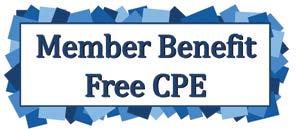
All programs begin at 8:00 a.m. Virtual and in-person attendance options available.
Learn more at: www.orcpa.org/free-cpe

New AICPA chair: ‘We need to promote the cool work we do’
Introducing the new AICPA Chair, Carla McCall, CPA, CGMA! With over 30 years of experience in the field, Carla is set to empower the next generation of CPAs by reimagining the profession with a focus on innovation and entrepreneurship.
Read more at: www.tinyurl.com/bdcu6zya
The annual financial audit for fiscal year 202324 is complete. For more information, contact Darlene Boles, CPA, Vice President/COO, at 503-597-5470 / 800-255-1470, ext. 117; dboles@orcpa.org
Get your team together for the 2024 OSCPA Fall basketball league. All genders and abilities welcome. Held at Beaverton Hoop YMCA, the league is limited to eight teams and 50% of your team must be your company’s employees. Season runs September 10 – October 17, ending with a single-elimination tournament. Build camaraderie while staying active!

Learn more at: www.orcpa.org/event/A24006
On May 9, 2024, CPAs, aspiring CPAs, and their family and friends, gathered to celebrate the accounting profession. OSCPA Chair John Hawkins emceed the event, with OSCPA Educational Foundation President Chris Dahlvig presenting awards to the 2024-25 scholarship recipients, the top college accounting students, and members reaching significant milestones. Guest speakers Martin Pittioni, Executive Director of the Oregon Board of Accountancy, and Raul Valdivia, Vice Chair of the Oregon Board of Accountancy, recognized exam scorers and administered the oath to the new CPAs.
We extend our gratitude to our Gold Sponsors Gleim Exam Prep and Banner Bank, along with event photographer Fletcher Wold.
Discover additional Circle of Excellence photos in our Flash from the Past series, on page 36. See more of this year’s photos at: www.orcpa.org/news/2024coe




OSCPA leaders convened in Newport for the annual Strategic Leadership Forum. Casino Night was a highlight, featuring trivia, photo booth fun, and casino games.
Thank you to all who attended, to presenters John Hawkins, Jason Orme, Tracy Allen, Selene Sullivan, and Adam Abplanalp, and to firms who sent Rising Stars.
Thank you also to our keynote Donna Salter of Catalyst Leadership, LLC and our OSCPA Legislative Counsel Nicole Palmateer Hazelbaker for sharing your time and expertise. We look forward to next year’s gathering!
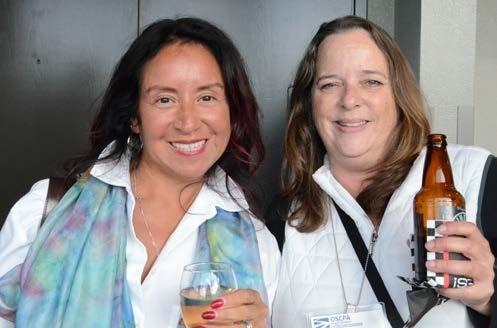





With an eye to the pipeline, the Rising Stars program encourages decision-makers to identify developing leaders and accompany them to the annual Strategic Leadership Forum. We were delighted to talk with two of this year’s Rising Stars and learn more about their experience.
Have a Rising Star at your firm or business?
Contact Sherri McPherson, President/CEO at smcpherson@orcpa.org or 503-597-5480. The Rising Stars program is open to all members, including but not limited to industry, public accounting, education, government, and not-for-profit.

HMW CPAs & Associates, LLC, North Bend
Being a CPA means that I have the opportunity to provide a greater benefit to my community. I have found fulfillment in my work by assisting friends, family, and those in the community tackle tricky tax situations that may feel like they are impossible to navigate. When I leave the office parking lot, I know that what I am doing matters. It’s an addictive feeling and drives me to continue to grow my skills so that I can continue to help those around me.
How has the CPA profession changed since you started your career?
During my roughly eight years in public accounting, the demand for CPAs has grown exponentially. The federal and state tax laws become more complex each year, pillars of the profession are retiring, and there is more and more of a need for CPAs in our community. I love hearing about students who want to pursue an accounting degree, and sincerely hope they stick with it and find the joy that I have found in being a CPA.
I am constantly inspired by my dad. He never hesitates to help others, many times offering before he is asked. Having spent almost his whole life on a ranch, he taught me the importance of working hard and persevering when times are tough. If it weren’t for my dad instilling those lessons in me, I don’t believe I would be the CPA I am today.

To me, being a CPA signifies serving as a trusted and dependable advisor to my clients. I view it as becoming an important part of their team, ready to assist wherever needed. It also represents a substantial personal achievement, one that required significant sacrifice and dedication. This accomplishment provides a sense of resilience and confidence, which I can draw upon when facing other challenges in life.
How has the CPA profession changed since you started your career?
Training, training, training! When I began my career in public accounting nine years ago, the common approach to training was “trial by fire,” “learn by doing,” or “nobody taught me, I just had to learn.” However, in the past five years or so, the industry has made a significant shift towards providing comprehensive training—not just conceptual but also procedural. This has proven to be particularly beneficial for younger staff members coming out of college or those new to the profession.
First and foremost, the biggest inspiration in my life is my wife. We’ve been married for 20 years, and we’ve witnessed each other grow profoundly. The biggest difference between us is that I couldn’t have done it without her! She has never doubted me and always provides the encouragement I need. Her support has seen me through the highs and lows of my career, always believing in my potential even when I had my doubts. She’s been the best mother to our children, is one of the strongest and most creative people I know, and I’m inspired more and more by her every day. Every day, I am reminded of how incredibly fortunate I am to share my life with such an amazing person.





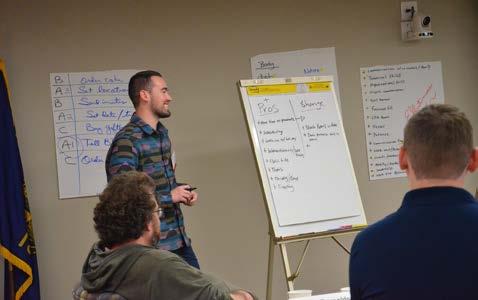
Your input is essential to our mission to bring you the best in continuing education. Your feedback helps determine what topics will be offered in the 2025-26 OSCPA-Select™ curriculum.
Take the survey: www.surveymonkey.com/r/2025CPE Survey opens by July 31, 2024.
Questions? Contact Tonna Hollis, Director, Professional Development + Events, at thollis@orcpa.org; 503-641-2700 / 800-255-1470, ext. 129.

Take the survey by August 16, 2024, for a chance to win a free OSCPA-Select™ 8-hour course!



Business & Industry Conference
October 17, 2024
In-person: Beaverton Webcast

Financial & Retirement Planning Conference
November 6, 2024
In-person: Beaverton Webcast

2024 OSCPA Professional Issues Update (4 hours - morning)
December 5, 2024
In-person: Beaverton Webcast

IRS/ Practitioners Forum
October 31, 2024
In-person: Portland Webcast

Northwest Federal Tax Conference™(2 days)
November 12-13, 2024
In-person: Beaverton Webcast

State & Local Tax Conference
January 6, 2025
In-person: Portland Webcast
Federal Tax Update with Greg White and George Koutelieris
January 15, 2025 – Portland & Webcast
January 16, 2025 – Eugene & Webcast


January 27, 2025
Webcast Only

According to Oregon Board of Accountancy’s OAR 801-040-010: Each biennial renewal period, all Active and Inactive licensees must take four-hours of ethics CPE. For the most current Oregon Administrative Rules (OARs), refer to the BOA website: www.tinyurl.com/OR-BOA-Rules.
A variety of OSCPA-Select™ ethics programs have been scheduled for 2024-25.
Oregon Ethics and New Developments (4 hours - morning)
• October 29, 2024 – Webcast Replay* – #W80574
• November 19, 2024 – Webcast Replay* – #W80595
• December 4, 2024 – Webcast – #W80608
• January 22, 2025 – Webcast Replay* – #W80643
Producer: Mark Hugh PLLC
*Webcast Replay Producer: ACPEN & Mark Hugh PLLC
Professional Conduct & Ethics - AICPA and Oregon Board CPA Regulatory Update by Jim Rigos (4 hours - morning)
• November 7, 2024 – Webcast – #W80589
Producer: Rigos Professional Education Programs, Ltd. Oregon & Washington Ethics 2024 (4 hours - morning)
• December 10, 2024 – Webcast – #W80613
Producer: Mark Hugh PLLC
Questions: Contact OSCPA at 503-641-7200 / 800-255-1470, ext. 3; profdev@orcpa.org

On-demand CPE from OSCPA gives you the flexibility you need to maximize your time. Gain access to convenient learning options at special member savings through our partnerships with Surgent CPE and AICPA.
Surgent’s Unlimited Plus CPE Package — $675 for OSCPA members
• Access to all Surgent live webinars (1,200+) to include late-breaking tax updates
• Over 250 on-demand/self-study courses
To order: www.orcpa.org/cpe/S03077
Surgent’s Unlimited Self-Study CPE Package — $389 for OSCPA members
• Over 250 on-demand/self-study courses totaling over 1,200 CPE credit hours
• Instant online grading and immediate CPE certificates via email
To order: www.orcpa.org/cpe/S03078
AICPA Annual WebcastPass — $675 for OSCPA members
• Unlimited access to 500+ webcasts featuring top experts, regulators, agency representatives, and more
• Immediate access to certificates of completion with zero tests
• Access to archived webcasts on-demand
To order: www.orcpa.org/cpe/S03080
AICPA CPExpress — $385 for OSCPA members
• Unlimited online access to over 450 quality courses
• Track and print CPE certificates in one place
To order: www.orcpa.org/cpe/S03081
CAMICO knows CPAs, because we are CPAs.

Created by CPAs, for CPAs, CAMICO’s guiding principle since 1986 has been to protect our policyholders through thick and thin. We are the program of choice for more than 8,000 accounting firms nationwide. Why?

CAMICO’s Professional Liability Insurance policy addresses the scope of services that CPAs provide.

Includes unlimited, no-cost access to specialists and risk management resources to help address the concerns and issues that you face as a CPA.

Provides potential claim counseling and expert claim assistance from internal specialists who will help you navigate the situation with tact, knowledge and expertise.
Does your insurance program go the extra mile? Visit www.camico.com to learn more.

ADDRESS SERVICE REQUESTED
Honoring CPAs, aspiring CPAs, and our accounting community is a cherished tradition at OSCPA. Here’s to another year of celebrating our dynamic profession.







